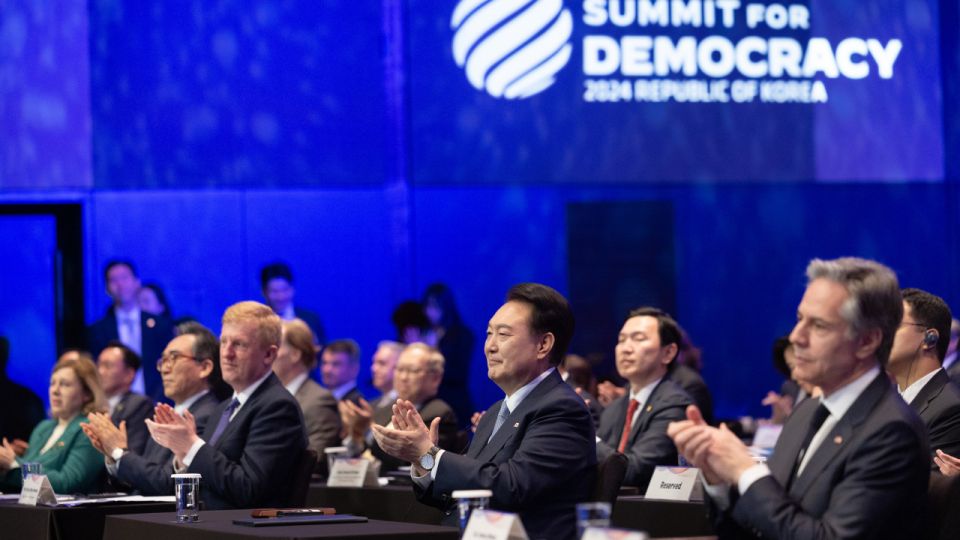March 19, 2024
SEOUL – The third Summit for Democracy kicked off on Monday in Seoul, underscoring the urgency of addressing digital technology threats, particularly the proliferation of disinformation fueled by artificial intelligence, which poses a challenge to the foundations of democracy.
President Yoon Suk Yeol shed light on the paradoxical nature of digital technologies, highlighting their simultaneous provision of “convenience” and their instigation of a “crisis of democracy” in his welcoming speech.
“Fake news and false information through the use of artificial intelligence and digital technology not only infringes upon individual freedoms and human rights but also poses a threat to democratic systems,” Yoon told around 300 participants in his remarks preceding the ministerial conference focused on “AI, Digital Technology and Democracy.”
Yoon also pointed out that the digital technology gap between countries widens economic disparities, which in turn can exacerbate disparities in democracy.
“With a sense of profound responsibility, we must share our experiences and gather wisdom to ensure that artificial intelligence and digital technologies enhance democracy while safeguarding the safety of individuals and society,” Yoon said.
The Summit for Democracy, an initiative pioneered by the Joe Biden administration, passed the baton to South Korea, a key treaty ally for the US in the Indo-Pacific region, to host the three-day event this year.
South Korea is the first country outside of the United States to host the Summit for Democracy independently. The goal of the international gathering is to stimulate dialogue and initiate concrete action toward global democratic renewal, as well as to counter authoritarianism and democratic backsliding.
In his opening speech, South Korean Foreign Minister Cho Tae-yul underscored that the third Summit for Democracy took place at a critical juncture, with the theme of “Democracy for Future Generations.”
“We are gathered here today at the defining moment in our history. At a time when geopolitical tensions are escalating, our world is witnessing a retreat from democratic values, which in turn reshapes the international landscape in profound ways,” Cho said in his speech in English.
Cho pointed out that the “breakneck speed of technological innovation is adding another layer of complexity to this dynamic.”
“In particular, the interplay of AI and digital technologies with democracy presents both unparalleled opportunities and formidable challenges.”
Cho underscored that digital technologies amplify threats of misinformation, disinformation and digital surveillance, “undermining the very foundations of democratic societies,” while enhancing democratic engagement.
“It is now upon us to steer this technological revolution in a way that upholds and promotes democratic values for the benefit of generations to come.”
Deputy Prime Minister of the United Kingdom Oliver Dowden emphasized the third Summit for Democracy coincides with a period where “democracy faces threats on multiple fronts.”
“This full spectrum of threats requires a full spectrum of response: increased cyber defenses, tackling mis- and disinformation, protections for candidates at home and global consensus abroad,” Dowden said in his opening speech.
Dowden also underscored that just as artificial intelligence is bound to bring swift progress to our lives, it has also enhanced the capabilities of individuals aiming to dupe and deceive others.
“The pace of progress and the globalized nature of this technology mean that we need to redouble our research efforts, raise awareness of these threats and deepen our collaboration.”
US Secretary of State Antony Blinken stressed that “AI is also a critical arena in which democracy is being challenged” during the ministerial conference.
Some governments are abusing AI and digital technologies to “spread mis- and disinformation that undermines free and fair elections, or sets one segment of our societies against another,” Blinken said. “Our democracies are hardly immune to the harms from AI misuse and failure.”
Blinken also echoed the sentiment of urgency in taking action to mitigate the negative impacts of AI-powered technologies on democracy.
“It’s a tremendous responsibility, but we have to meet it at this moment. Because again — I’ll close with this — this is moving so fast, it’s moving so quickly, that what is decided now and in the weeks and months ahead is going to shape the future for generations to come,” Blinken said.
“So there’s an urgency to this effort, and we’ll be much more effective, much stronger when we work together.”
Blinken and Cho also held a separate bilateral meeting on the sidelines of the summit where they engaged in “deep and strategic discussions” covering a wide range of issues, including North Korea’s missile launch on the same day, according to South Korea’s Foreign Ministry.
The South Korean military said that North Korea launched what is presumed to be multiple short-range ballistic missiles from the vicinity of Pyongyang toward the East Sea at around 7:44 a.m. The launches took place shortly before the opening of the Summit for Democracy at 10 a.m.
“Both ministers condemned North Korea’s launch of multiple suspected short-range ballistic missiles today just before our government hosts the Summit for Democracy held to contribute to global freedom, peace and prosperity through the promotion of democracy,” Seoul’s Foreign Ministry said.
Cho and Blinken “expressed concerns over any potential unilateral attempts by North Korea to alter the status quo in the West Sea” and concurred on maintaining close coordination in response, according to the Foreign Ministry.


